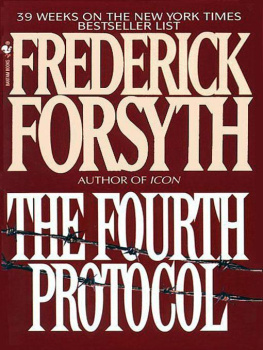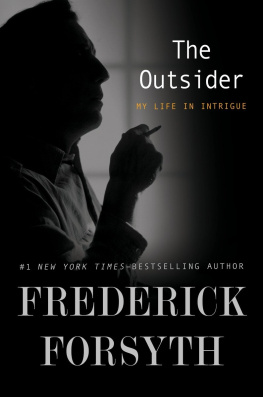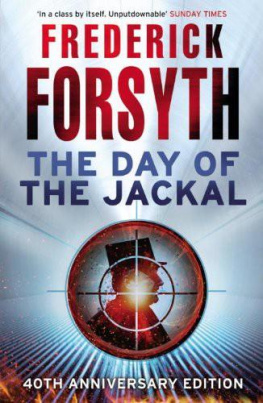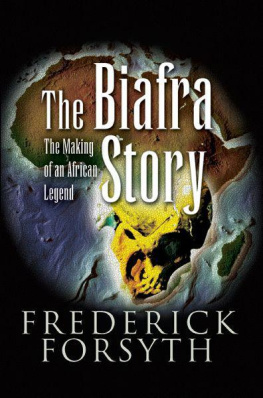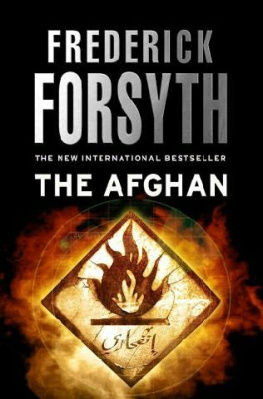Frederick Forsyth - The Devil's Alternative
Here you can read online Frederick Forsyth - The Devil's Alternative full text of the book (entire story) in english for free. Download pdf and epub, get meaning, cover and reviews about this ebook. genre: Detective and thriller. Description of the work, (preface) as well as reviews are available. Best literature library LitArk.com created for fans of good reading and offers a wide selection of genres:
Romance novel
Science fiction
Adventure
Detective
Science
History
Home and family
Prose
Art
Politics
Computer
Non-fiction
Religion
Business
Children
Humor
Choose a favorite category and find really read worthwhile books. Enjoy immersion in the world of imagination, feel the emotions of the characters or learn something new for yourself, make an fascinating discovery.

- Book:The Devil's Alternative
- Author:
- Genre:
- Rating:3 / 5
- Favourites:Add to favourites
- Your mark:
- 60
- 1
- 2
- 3
- 4
- 5
The Devil's Alternative: summary, description and annotation
We offer to read an annotation, description, summary or preface (depends on what the author of the book "The Devil's Alternative" wrote himself). If you haven't found the necessary information about the book — write in the comments, we will try to find it.
The Devil's Alternative — read online for free the complete book (whole text) full work
Below is the text of the book, divided by pages. System saving the place of the last page read, allows you to conveniently read the book "The Devil's Alternative" online for free, without having to search again every time where you left off. Put a bookmark, and you can go to the page where you finished reading at any time.
Font size:
Interval:
Bookmark:
PRAISE FOR
THE DEVILS ALTERNATIVE
An enormous plot that builds unfalteringly, a staggeringly well-detailed international thriller that shows him in blazing top form.
Kirkus Reviews
Vintage Forsyth: an intricate story that works!
Nashville Banner
More flips than a trapeze artist, including a final twist that left this unsuspecting reader cursing Forsyths clevernesswith admiration.
Chicago Sun-Times
A by-the-lapels thriller that ... is disturbingly current, chillingly believable. ... Forsyth places a million-ton bomb in its midst and lights a fuse that crackles and races across the globe.
Louisville Times
Brilliantly conceived, chess-game of a novel. ... You will be so spellbound that ... you cannot quit reading.
Columbus Dispatch
The Devils Alternative
by Frederick Forsyth
THE CASTAWAY would have been dead before sundown but for the sharp eyes of an Italian seaman called Mario. By the time he was spotted he had lapsed into unconsciousness, the exposed parts of his near-naked body grilled to second-degree burns by the relentless sun, and those parts submerged in seawater soft and white between the salt sores like the limbs of a rotting goose.
Mario Curcio was the cook-steward on the Garibaldi, an amiable old rust bucket out of Brindisi, thumping her way eastward toward Cape Ince and on to Trabzon in the far eastern corner of the north shore of Turkey. She was on her way to pick up a cargo of almonds from Anatolia.
Just why Mario decided that morning in the last ten days of April 1982 to empty his bucket of potato peelings over the lee rail instead of through the garbage chute at the poop, he could never explain, nor was he ever asked to. But perhaps to take a breath of fresh Black Sea air and break the monotony of the steam heat in the cramped galley, he stepped out on deck, strolled to the starboard rail, and hurled his garbage to an indifferent but patient sea. He turned away and started to lumber back to his duties. After two steps he stopped, frowned, turned, and walked back to the rail, puzzled and uncertain.
The ship was heading east-northeast to clear Cape Ince, so that as he shielded his eyes and gazed abaft the beam, the noon sun was almost straight in his face. But he was sure he had seen something out there on the blue-green rolling swell between the ship and the coast of Turkey, twenty miles to the south. Unable to see it again, he trotted up the afterdeck, mounted the outside ladders to the wing of the bridge, and peered again. Then he saw it, quite clearly, for half a second between the softly moving hills of water. He turned to the open door behind him, leading into the wheelhouse, and shouted Capitano!
Captain Vittorio Ingrao took some persuading, for Mario was a simple lad, but he was enough of a sailor to know that if a man might be out there on the water, he was duty-bound to turn his ship around and have a closer look, and his radar had indeed revealed an echo. It took the captain half an hour to bring the Garibaldi around and back to the spot Mario had pointed at, and then he, too, saw it.
The skiff was barely twelve feet long, and not very wide. A light craft, of the type that could have been a ships jolly boat. Forward of midships there was a single thwart across the boat, with a hole in it for the stepping of a mast. But either there had never been a mast or it had been ill-secured and had gone overboard. With the Garibaldi stopped and wallowing in the swell, Captain Ingrao leaned on the bridgewing rail and watched Mario and the bosun, Paolo Longhi, set off in the motor lifeboat to bring the skiff alongside. From his elevation he could look down into the skiff as it was towed closer.
The man in it was lying on his back in several inches of seawater. He was gaunt and emaciated, bearded and unconscious, his head to one side, breathing in short gasps. He moaned a few times as he was lifted aboard and the sailors hands touched his flayed shoulders and chest.
There was one permanently spare cabin on the Garibaldi, kept free as a sort of sick bay, and the castaway was taken to it. Mario, at his own request, was given time off to tend the man, whom he soon came to regard as his personal property, as a boy will take special care of a puppy he has personally rescued from death. Longhi, the bosun, gave the man a shot of morphine from the first-aid chest to spare him the pain, and the pair of them set to work on the sunburn.
Being Calabrians they knew a bit about sunburn and prepared the best sunburn salve in the world. Mario brought from his galley a fifty-fifty mixture of fresh lemon juice and wine vinegar in a basin, a light cotton cloth torn from his pillowcase, and a bowl of ice cubes. Soaking the cloth in the mixture and wrapping it around a dozen ice cubes, he gently pressed the pad to the worst areas, where the ultraviolet rays had bitten through almost to the bone. Plumes of steam rose from the unconscious man as the freezing astringent drew the heat out of the scorched flesh. The man shuddered.
Better a fever than death by burn shock. Mario told him in Italian. The man could not hear, and if he had, he could not have understood.
Longhi joined his skipper on the afterdeck, where the skiff had been hauled.
Anything? he asked.
Captain Ingrao shook his head.
Nothing on the man, either. No watch, no name tag. A pair of cheap underpants with no label. And his beard looks about ten days old.
Theres nothing here, either, said Ingrao. No mast, no sail, no oars. No food and no water container. No name on the boat, even. But it could have peeled off.
A tourist from a beach resort, blown out to sea? asked Longhi.
Ingrao shrugged. Or a survivor from a small freighter, he said. Well be at Trabzonin two days. The Turkish authorities can solve that one when he wakes up and talks. Meanwhile, lets get under way. Oh, and we must cable our agent there and tell him whats happened. Well need an ambulance on the quay when we dock.
Two days later the castaway, still barely conscious and unable to speak, was tucked up between white sheets in a sick ward in the small municipal hospital of Trabzon.
Mario the sailor had accompanied his castaway in the ambulance from the quay to the hospital, along with the ships agent and the ports medical officer, who had insisted on checking the delirious man for communicable diseases. After waiting an hour by the bedside, he had bade his unconscious friend farewell and returned to the Garibaldi to prepare the crews lunch. That had been the previous day, and the old Italian tramp steamer had sailed during the evening.
Now another man stood by the bedside, accompanied by a police officer and the white-coated doctor. All three were Turkish, but the short, broad man in the civilian suit spoke passable English.
Hell pull through, said the doctor, but hes very sick for the moment. Heatstroke, second-degree sunburn, exposure generally, and by the look of it, he hasnt eaten for days. Generally weak.
What are these? asked the civilian, gesturing at the intravenous tubes that entered both the mans arms.
Saline drip and concentrated glucose drip for nourishment and to offset shock, said the doctor. The sailors probably saved his life by taking the heat out of the burns, but weve bathed him in calamine to help the healing process. Now its between him and Allah.
Umit Erdal, partner in the shipping and trading company of Erdal and Semait, was the Lloyds subagent for the port of Trabzon, and the Garibaldis agent had thankfully passed the matter of the castaway over to him. The sick mans eyelids fluttered in the nut-brown, bearded face. Erdal cleared his throat, bent over the figure, and spoke in his best English.
Next pageFont size:
Interval:
Bookmark:
Similar books «The Devil's Alternative»
Look at similar books to The Devil's Alternative. We have selected literature similar in name and meaning in the hope of providing readers with more options to find new, interesting, not yet read works.
Discussion, reviews of the book The Devil's Alternative and just readers' own opinions. Leave your comments, write what you think about the work, its meaning or the main characters. Specify what exactly you liked and what you didn't like, and why you think so.

